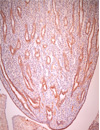Contact
Department of Cellular Physiology
Biomedical Center Munich - BMC
Großhaderner Str. 9
D-82152 Planegg-Martinsried
Room:
N.C 01.010
Phone:
+49 (0) 89 2180 71565
Fax:
+49 (0) 89 2180 71732
Email:
christoph.kueper@lrz.uni-muenchen.de
Research Interests

The cells of the renal inner medulla have to cope with harsh conditions, such as high osmolalities of up to 1200 mosmol/kg or low PO2 down to 10 mm Hg, and may also be confronted with pathogenic bacteria from ascending urinary tract infections. Medullary cells have developed various mechanisms to ensure survival in this hostile environment. An important mechanism of cell protection is the activation of the osmosensitive transcription factor NFAT5 (Nuclear Factor of Activated T-cells 5), also known as TonEBP.
NFAT5 participates in cell volume regulation and also contributes to the urinary concentration mechanism. Numerous studies in recent years have revealed that, in addition to these “classical” physiological functions, NFAT5 plays also an important role under various pathophysiological conditions, both inside and outside the kidney. NFAT5-induced synthesis of nitric oxide (NO) in macrophages promotes cutaneous antimicrobial defense, and NFAT5-mediated chemokine expression in epithelial cells attracts immune cells to the renal medulla to establish an antibacterial defense zone against ascending urinary tract infections. On the other hand, a pathologically increased NFAT5-activity may contribute to carcinogenesis in several tumor entities, or onset of pancreatic islet autoimmunity during type 1 diabetes.
Investigation of NFAT5 activity in vivo has long been limited by the fact that constitutive NFAT5-knock-out mice show high perinatal lethality. We have therefore developed a conditional NFAT5-knock-out mouse for in vivo studies, in which NFAT5 expression can be knocked down in adult animals to allow the role of NFAT5 during various physiological and pathophysiological processes to be studied. Our work involves the whole spectrum of modern molecular biology techniques, including (quantitative) PCR, reporter gene assays, Western blotting, ELISA, gel retardation assays, molecular cloning or immuno-histochemistry.

